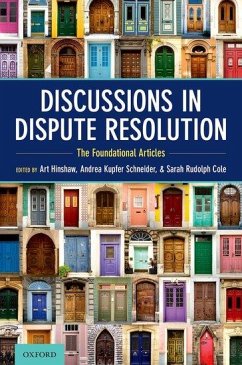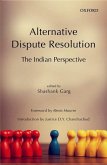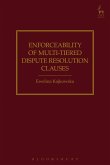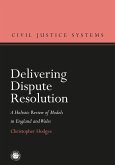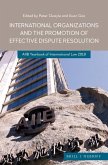Discussions in Dispute Resolution
The Foundational Articles
Herausgeber: Hinshaw, Art; Cole, Sarah Rudolph; Schneider, Andrea Kupfer
Discussions in Dispute Resolution
The Foundational Articles
Herausgeber: Hinshaw, Art; Cole, Sarah Rudolph; Schneider, Andrea Kupfer
- Gebundenes Buch
- Merkliste
- Auf die Merkliste
- Bewerten Bewerten
- Teilen
- Produkt teilen
- Produkterinnerung
- Produkterinnerung
This book brings together 16 foundational writings in the field of alternative dispute resolution. These writings consist of four pieces from each of the field's primary subfields--negotiation, mediation, arbitration, and public policy. Each piece has four commenters who answer the question: why is this work a foundational piece in the dispute resolution field? The purpose in asking this simple question is fourfold: to hail the field's foundational generation and their work, to bring a fresh look at these articles, to engage the articles' original authors where possible, and to challenge the articles with the benefit of hindsight.…mehr
Andere Kunden interessierten sich auch für
![Alternative Dispute Resolution Alternative Dispute Resolution]() Alternative Dispute Resolution54,99 €
Alternative Dispute Resolution54,99 €![International Investment, Political Risk, and Dispute Resolution International Investment, Political Risk, and Dispute Resolution]() Noah Rubins QcInternational Investment, Political Risk, and Dispute Resolution299,99 €
Noah Rubins QcInternational Investment, Political Risk, and Dispute Resolution299,99 €![Enforceability of Multi-Tiered Dispute Resolution Clauses Enforceability of Multi-Tiered Dispute Resolution Clauses]() Ewelina KajkowskaEnforceability of Multi-Tiered Dispute Resolution Clauses142,99 €
Ewelina KajkowskaEnforceability of Multi-Tiered Dispute Resolution Clauses142,99 €![Delivering Dispute Resolution Delivering Dispute Resolution]() Christopher HodgesDelivering Dispute Resolution145,99 €
Christopher HodgesDelivering Dispute Resolution145,99 €![International Dispute Resolution International Dispute Resolution]() International Dispute Resolution65,99 €
International Dispute Resolution65,99 €![International Organizations and the Promotion of Effective Dispute Resolution International Organizations and the Promotion of Effective Dispute Resolution]() International Organizations and the Promotion of Effective Dispute Resolution163,99 €
International Organizations and the Promotion of Effective Dispute Resolution163,99 €![China and International Dispute Resolution in the Context of the 'Belt and Road Initiative' China and International Dispute Resolution in the Context of the 'Belt and Road Initiative']() China and International Dispute Resolution in the Context of the 'Belt and Road Initiative'207,99 €
China and International Dispute Resolution in the Context of the 'Belt and Road Initiative'207,99 €-
-
-
This book brings together 16 foundational writings in the field of alternative dispute resolution. These writings consist of four pieces from each of the field's primary subfields--negotiation, mediation, arbitration, and public policy. Each piece has four commenters who answer the question: why is this work a foundational piece in the dispute resolution field? The purpose in asking this simple question is fourfold: to hail the field's foundational generation and their work, to bring a fresh look at these articles, to engage the articles' original authors where possible, and to challenge the articles with the benefit of hindsight.
Hinweis: Dieser Artikel kann nur an eine deutsche Lieferadresse ausgeliefert werden.
Hinweis: Dieser Artikel kann nur an eine deutsche Lieferadresse ausgeliefert werden.
Produktdetails
- Produktdetails
- Verlag: Hurst & Co.
- Seitenzahl: 440
- Erscheinungstermin: 10. Juni 2021
- Englisch
- Abmessung: 241mm x 160mm x 23mm
- Gewicht: 816g
- ISBN-13: 9780197513248
- ISBN-10: 0197513247
- Artikelnr.: 60978427
- Herstellerkennzeichnung
- Libri GmbH
- Europaallee 1
- 36244 Bad Hersfeld
- gpsr@libri.de
- Verlag: Hurst & Co.
- Seitenzahl: 440
- Erscheinungstermin: 10. Juni 2021
- Englisch
- Abmessung: 241mm x 160mm x 23mm
- Gewicht: 816g
- ISBN-13: 9780197513248
- ISBN-10: 0197513247
- Artikelnr.: 60978427
- Herstellerkennzeichnung
- Libri GmbH
- Europaallee 1
- 36244 Bad Hersfeld
- gpsr@libri.de
Art Hinshaw is the John J. Bouma Fellow, the Founding Director of the Lodestar Dispute Resolution Center, and a Clinical Professor of Law at the Sandra Day O'Connor College of Law at Arizona State University. Professor Hinshaw's scholarship focuses on mediation and negotiation theory and practice, and he is a co-author on the 6th edition of the classic textbook Dispute Resolution & Lawyers: A Contemporary Approach and author of numerous articles and book chapters. Currently he is a member of the ABA's Standing Committee on Mediator Ethical Guidance and a regular contributor to Indisputably: the ADR Prof Blog. He is a former member of the Arizona Commission on Judicial Conduct. Andrea Kupfer Schneider is a Professor of Law, the inaugural director of the Institute for Women's Leadership at Marquette University and the Director of the law school's nationally ranked dispute resolution program. She frequently publishes law review articles and book chapters on negotiation, gender, and international conflict and has co-authored several leading legal textbooks on ADR, Negotiation, Mediation and Plea Bargaining. Andrea is a founding editor of Indisputably, the blog for ADR law faculty and started the Dispute Resolution Works-in-Progress Annual Conference in 2007. She was named 2009 Woman of the Year by the Wisconsin Law Journal and, in 2016, gave her first TEDx talk entitled Women Don't Negotiate and Other Similar Nonsense. She was named the 2017 recipient of the ABA Section of Dispute Resolution Award for Outstanding Scholarly Work. Sarah Rudolph Cole is the Michael E. Moritz Chair in Alternative Dispute Resolution, Moritz College of Law, Ohio State University; Professor Cole clerked on the Ninth Circuit for Eugene A. Wright. She practiced labor and employment law and was on the faculty at Creighton University School of Law before joining the Moritz faculty in 1998. She is co-author, with Nancy Rogers, James Coben, Peter Thompson and Craig McEwen of Mediation: Law, Policy and Practice and Dispute Resolution: Negotiation, Mediation and Other Processes with Nancy Rogers, Stephen Goldberg and Frank Sander. She is the director of the Program on Dispute Resolution at Moritz. In 2013, Ohio State awarded her the Alumni Award for Distinguished Teaching. She serves on arbitration and mediation panels for AAA and the State of Ohio and visited at Harvard Law School in Fall 2019.
* Introduction * Table of Contributors * Acknowledgments * Part 1. Negotiation * Article 1.1. Bargaining in the Shadow of the Law: The Case of Divorce (1979)
Robert H. Mnookin and Lewis Kornhauser * Comments: * Elizabeth C. Tippett
Bargaining in the Shadow of the Law: The Case for ADR as a Field of Study * Rebecca Hollander
Blumoff
Taking Human Behavior Seriously * Rishi Batra
Bargaining in the Shadow of the Law: A Classic Article with a Contemporary Challenge * Robert H. Mnookin
Bargaining in the Shadow of the Law Re
assessed * Article 1.2. Machiavelli and the Bar: Ethical Limitations on Lying in Negotiation (1980)
James J. White * Comments: * Michael Moffitt
Machiavelli and the Bar and Ethical Ratcheting * Peter R. Reilly
Machiavelli and the Bar: J.J. White as Negotiation Ethics Architect * Lauren A. Newell
Machiavelli and the Bar: Prescient in Part * James J. White
Confronting Lying in Negotiation * Article 1.3. Toward Another View of Legal Negotiation: The Structure of Problem Solving (1984)
Carrie Menkel
Meadow * Comments: * Russell Korobkin
We Are All Problem Solvers Now * Erin R. Archerd
It's Not the Lawyers We Need to Convince: Commentary on Legal Negotiation by Carrie Menkel
Meadow * Andrea Kupfer Schneider
Counseling About More than the Law * Carrie Menkel
Meadow
The Origins of Problem Solving Negotiation and Its Use in the Present * Article 1.4. The Limits of Integrative Bargaining (1996)
Gerald B. Wetlaufer * Comments: * Jennifer Reynolds
Oversimplifying, Overselling, Overreaching * Noam Ebner
Integrative Negotiation: Paying the Price of Popularity * Robert C. Bordone
Strengthening Integrative Bargaining: How The Limits of Integrative Bargaining Sharpened the Work of Negotiation Scholars * Gerald B. Wetlaufer
Reflections on The Limits of Integrative Bargaining * Part 2. Mediation * Article 2.1. Mediation: Its Forms and Functions (1971)
Lon L. Fuller * Comments: * Art Hinshaw
Lon L. Fuller: Private Ordering and Mediation * Nancy A. Welsh
The Untethering of Mediation from Relationships * James J. Alfini
Lon Fuller's Influence on the Debate Over Mediator Orientations * Becky L. Jacobs
Lon Fuller: A Progenitor of the Pedagogy of Skills? * Article 2.2. The Theory and Practice of Mediation: A Reply to Professor Susskind (1981)
Joseph B. Stulberg * Comments: * Lela Porter Love
A Star to Steer Her By * Brian A. Pappas
Just Settlement? Rethinking the Mediator's Goals * Bobbi McAdoo and Sharon Press
Neutrality in 2020: A Reply to 1981 Stulberg * Joseph B. Stulberg
Revisiting Mediator Neutrality * Article 2.3. The Mediation Alternative: Process Dangers for Women (1991)
Trina Grillo * Comments: * Carol Pauli
Trina Grillo: Productive Rage * Karen Tokarz
Grillo's Rigorous Path to Intentional, Mindful Mediation * Douglas N. Frenkel
The Grillo Effect at Thirty * Kelly Browe Olson
Post
Grillo: New Family Mediation Protections and Revised Dangers * Article 2.4. Understanding Mediators' Orientations, Strategies, and Techniques: A Grid for the Perplexed (1996)
Leonard L. Riskin * Comments: * Michael T. Colatrella, Jr.
"True Enough" * Alyson Carrel
Dismantling the "Facilitative" "Evaluative" Dichotomy: Reflecting on Riskin's Grid and Predicting the Future * Donna Erez
Navot
The Riskin Grid: A Mixed Legacy * Kimberlee Kovach
Growth from the Grid? * Part 3. Arbitration * Article 3.1. The New Federal Arbitration Law (1926)
Julius Henry Cohen and Kenneth Dayton * Comments: * Carli N. Conklin
A Robust History of Arbitration in Early America: Commentary on The New Federal Arbitration Law * Imre S. Szalai
The Federal Arbitration Act in Its Infancy: Cohen and Dayton's The New Federal Arbitration Law * Kristen Blankley
The New Federal Arbitration Law: A Call to Ethical Practice Not Yet Realized * Amy J. Schmitz
Emphasizing Efficiency in the Digital Age * Article 3.2. Commercial Arbitration (1961)
Soia Mentschikoff * Comments: * Sarah R. Cole
Everything Old Is New Again * W. Mark C. Weidemaier
The Legacy of Soia Mentschikoff's Commercial Arbitration * David Horton
Inside the Black Box: A Short Comment on Soia Mentschikoff's Commercial Arbitration * Stephen J. Ware
Lasting Lessons from Mentschikoff's Commercial Arbitration * Article 3.3. Panacea or Corporate Tool?: Debunking the Supreme Court's Preference for Binding Arbitration (1996)
Jean R. Sternlight * Comments: * Jill I. Gross
Rethinking the Debunking: On Arbitration Myths, Preferences, and Legal Theory * Hiro N. Aragaki
The Critical Theory Legacy of Jean Sternlight's Panacea or Corporate Tool? * Michael Z. Green
Framing the Debate to Show How Big Guys Insist That Little Guys Arbitrate as a Corporate Tool * Jean R. Sternlight
Panacea or Corporate Tool?: The Sequel * Article 3.4. Employment Arbitration: The Repeat Player Effect (1997)
Lisa B. Bingham [Lisa Blomgren Amsler] * Comments: * Alexander J.S. Colvin
The River's Source: Empirical Research and Lisa Blomgren Amsler's Employment Arbitration: The Repeat Player Effect * Martin H. Malin
Arbitration's Catalyst for Empirical Studies * Richard Bales
The Historical Context of Lisa Blomgren Amsler's Empirical Work on Employment Arbitration * Lisa Blomgren Amsler
Why the Haves Come Out Farther and Farther Ahead: The Repeat Player Effect, Control Over Dispute System Design, and Justice * Part 4. Dispute Resolution Public Policy * Article 4.1. Why the "Haves" Come out Ahead: Speculations on the Limits of Legal Change (1974)
Marc Galanter * Comments: * John Lande
For Pragmatic Romanticism in Law and Dispute Resolution: Reflections on Galanter's Remarkably Realistic Analysis of Why the Have
Nots Come Out Behind * Dwight Golann
A Prescient Warning of the Vulnerabilities in ADR * Cynthia Alkon
Galanter's Analysis of the "Limits of Legal Change" as Applied to Criminal Cases and Reform * Marc Galanter
Reflections on Why the "Haves" Come Out Ahead * Article 4.2. Varieties of Dispute Processing (1976)
Frank E. A. Sander * Comments: * Donna Shestowsky
How Useful Is Court ADR If Litigants (Still) Don't Know About It? * Lydia Nussbaum
Dispute Processing Beyond the Courts
New Complexity, Old Problems * Deborah Thompson Eisenberg
Frank Sander: Father of Court
Based Dispute Resolution * Yael Efron
Varieties of Dispute Processing: The Implications on Legal Education * Article 4.3. Against Settlement (1984)
Owen M. Fiss * Comments: * Amy J. Cohen
ADR and Public Values Again * Ellen Waldman
What Against Settlement Got Right * Adam S. Zimmerman
From Mass Adjudication to Settlement and Back * Marjorie Corman Aaron
The Haunting Specter of Fiss's Against Settlement * Article 4.4. Pursuing Settlement in an Adversary Culture: A Tale of Innovation Co
Opted or "The Law of ADR" (1991)
Carrie Menkel
Meadow * Comments: * Ellen E. Deason
Dimensions of Quality of Justice * Elayne E. Greenberg
ADR's Place at the Justice Table * James Coben
Foundational Because Prescient (and Unfortunately, Cassandra
like Prescience) * Carrie Menkel
Meadow
Institutionalizing ADR: Clashing Values
Robert H. Mnookin and Lewis Kornhauser * Comments: * Elizabeth C. Tippett
Bargaining in the Shadow of the Law: The Case for ADR as a Field of Study * Rebecca Hollander
Blumoff
Taking Human Behavior Seriously * Rishi Batra
Bargaining in the Shadow of the Law: A Classic Article with a Contemporary Challenge * Robert H. Mnookin
Bargaining in the Shadow of the Law Re
assessed * Article 1.2. Machiavelli and the Bar: Ethical Limitations on Lying in Negotiation (1980)
James J. White * Comments: * Michael Moffitt
Machiavelli and the Bar and Ethical Ratcheting * Peter R. Reilly
Machiavelli and the Bar: J.J. White as Negotiation Ethics Architect * Lauren A. Newell
Machiavelli and the Bar: Prescient in Part * James J. White
Confronting Lying in Negotiation * Article 1.3. Toward Another View of Legal Negotiation: The Structure of Problem Solving (1984)
Carrie Menkel
Meadow * Comments: * Russell Korobkin
We Are All Problem Solvers Now * Erin R. Archerd
It's Not the Lawyers We Need to Convince: Commentary on Legal Negotiation by Carrie Menkel
Meadow * Andrea Kupfer Schneider
Counseling About More than the Law * Carrie Menkel
Meadow
The Origins of Problem Solving Negotiation and Its Use in the Present * Article 1.4. The Limits of Integrative Bargaining (1996)
Gerald B. Wetlaufer * Comments: * Jennifer Reynolds
Oversimplifying, Overselling, Overreaching * Noam Ebner
Integrative Negotiation: Paying the Price of Popularity * Robert C. Bordone
Strengthening Integrative Bargaining: How The Limits of Integrative Bargaining Sharpened the Work of Negotiation Scholars * Gerald B. Wetlaufer
Reflections on The Limits of Integrative Bargaining * Part 2. Mediation * Article 2.1. Mediation: Its Forms and Functions (1971)
Lon L. Fuller * Comments: * Art Hinshaw
Lon L. Fuller: Private Ordering and Mediation * Nancy A. Welsh
The Untethering of Mediation from Relationships * James J. Alfini
Lon Fuller's Influence on the Debate Over Mediator Orientations * Becky L. Jacobs
Lon Fuller: A Progenitor of the Pedagogy of Skills? * Article 2.2. The Theory and Practice of Mediation: A Reply to Professor Susskind (1981)
Joseph B. Stulberg * Comments: * Lela Porter Love
A Star to Steer Her By * Brian A. Pappas
Just Settlement? Rethinking the Mediator's Goals * Bobbi McAdoo and Sharon Press
Neutrality in 2020: A Reply to 1981 Stulberg * Joseph B. Stulberg
Revisiting Mediator Neutrality * Article 2.3. The Mediation Alternative: Process Dangers for Women (1991)
Trina Grillo * Comments: * Carol Pauli
Trina Grillo: Productive Rage * Karen Tokarz
Grillo's Rigorous Path to Intentional, Mindful Mediation * Douglas N. Frenkel
The Grillo Effect at Thirty * Kelly Browe Olson
Post
Grillo: New Family Mediation Protections and Revised Dangers * Article 2.4. Understanding Mediators' Orientations, Strategies, and Techniques: A Grid for the Perplexed (1996)
Leonard L. Riskin * Comments: * Michael T. Colatrella, Jr.
"True Enough" * Alyson Carrel
Dismantling the "Facilitative" "Evaluative" Dichotomy: Reflecting on Riskin's Grid and Predicting the Future * Donna Erez
Navot
The Riskin Grid: A Mixed Legacy * Kimberlee Kovach
Growth from the Grid? * Part 3. Arbitration * Article 3.1. The New Federal Arbitration Law (1926)
Julius Henry Cohen and Kenneth Dayton * Comments: * Carli N. Conklin
A Robust History of Arbitration in Early America: Commentary on The New Federal Arbitration Law * Imre S. Szalai
The Federal Arbitration Act in Its Infancy: Cohen and Dayton's The New Federal Arbitration Law * Kristen Blankley
The New Federal Arbitration Law: A Call to Ethical Practice Not Yet Realized * Amy J. Schmitz
Emphasizing Efficiency in the Digital Age * Article 3.2. Commercial Arbitration (1961)
Soia Mentschikoff * Comments: * Sarah R. Cole
Everything Old Is New Again * W. Mark C. Weidemaier
The Legacy of Soia Mentschikoff's Commercial Arbitration * David Horton
Inside the Black Box: A Short Comment on Soia Mentschikoff's Commercial Arbitration * Stephen J. Ware
Lasting Lessons from Mentschikoff's Commercial Arbitration * Article 3.3. Panacea or Corporate Tool?: Debunking the Supreme Court's Preference for Binding Arbitration (1996)
Jean R. Sternlight * Comments: * Jill I. Gross
Rethinking the Debunking: On Arbitration Myths, Preferences, and Legal Theory * Hiro N. Aragaki
The Critical Theory Legacy of Jean Sternlight's Panacea or Corporate Tool? * Michael Z. Green
Framing the Debate to Show How Big Guys Insist That Little Guys Arbitrate as a Corporate Tool * Jean R. Sternlight
Panacea or Corporate Tool?: The Sequel * Article 3.4. Employment Arbitration: The Repeat Player Effect (1997)
Lisa B. Bingham [Lisa Blomgren Amsler] * Comments: * Alexander J.S. Colvin
The River's Source: Empirical Research and Lisa Blomgren Amsler's Employment Arbitration: The Repeat Player Effect * Martin H. Malin
Arbitration's Catalyst for Empirical Studies * Richard Bales
The Historical Context of Lisa Blomgren Amsler's Empirical Work on Employment Arbitration * Lisa Blomgren Amsler
Why the Haves Come Out Farther and Farther Ahead: The Repeat Player Effect, Control Over Dispute System Design, and Justice * Part 4. Dispute Resolution Public Policy * Article 4.1. Why the "Haves" Come out Ahead: Speculations on the Limits of Legal Change (1974)
Marc Galanter * Comments: * John Lande
For Pragmatic Romanticism in Law and Dispute Resolution: Reflections on Galanter's Remarkably Realistic Analysis of Why the Have
Nots Come Out Behind * Dwight Golann
A Prescient Warning of the Vulnerabilities in ADR * Cynthia Alkon
Galanter's Analysis of the "Limits of Legal Change" as Applied to Criminal Cases and Reform * Marc Galanter
Reflections on Why the "Haves" Come Out Ahead * Article 4.2. Varieties of Dispute Processing (1976)
Frank E. A. Sander * Comments: * Donna Shestowsky
How Useful Is Court ADR If Litigants (Still) Don't Know About It? * Lydia Nussbaum
Dispute Processing Beyond the Courts
New Complexity, Old Problems * Deborah Thompson Eisenberg
Frank Sander: Father of Court
Based Dispute Resolution * Yael Efron
Varieties of Dispute Processing: The Implications on Legal Education * Article 4.3. Against Settlement (1984)
Owen M. Fiss * Comments: * Amy J. Cohen
ADR and Public Values Again * Ellen Waldman
What Against Settlement Got Right * Adam S. Zimmerman
From Mass Adjudication to Settlement and Back * Marjorie Corman Aaron
The Haunting Specter of Fiss's Against Settlement * Article 4.4. Pursuing Settlement in an Adversary Culture: A Tale of Innovation Co
Opted or "The Law of ADR" (1991)
Carrie Menkel
Meadow * Comments: * Ellen E. Deason
Dimensions of Quality of Justice * Elayne E. Greenberg
ADR's Place at the Justice Table * James Coben
Foundational Because Prescient (and Unfortunately, Cassandra
like Prescience) * Carrie Menkel
Meadow
Institutionalizing ADR: Clashing Values
* Introduction * Table of Contributors * Acknowledgments * Part 1. Negotiation * Article 1.1. Bargaining in the Shadow of the Law: The Case of Divorce (1979)
Robert H. Mnookin and Lewis Kornhauser * Comments: * Elizabeth C. Tippett
Bargaining in the Shadow of the Law: The Case for ADR as a Field of Study * Rebecca Hollander
Blumoff
Taking Human Behavior Seriously * Rishi Batra
Bargaining in the Shadow of the Law: A Classic Article with a Contemporary Challenge * Robert H. Mnookin
Bargaining in the Shadow of the Law Re
assessed * Article 1.2. Machiavelli and the Bar: Ethical Limitations on Lying in Negotiation (1980)
James J. White * Comments: * Michael Moffitt
Machiavelli and the Bar and Ethical Ratcheting * Peter R. Reilly
Machiavelli and the Bar: J.J. White as Negotiation Ethics Architect * Lauren A. Newell
Machiavelli and the Bar: Prescient in Part * James J. White
Confronting Lying in Negotiation * Article 1.3. Toward Another View of Legal Negotiation: The Structure of Problem Solving (1984)
Carrie Menkel
Meadow * Comments: * Russell Korobkin
We Are All Problem Solvers Now * Erin R. Archerd
It's Not the Lawyers We Need to Convince: Commentary on Legal Negotiation by Carrie Menkel
Meadow * Andrea Kupfer Schneider
Counseling About More than the Law * Carrie Menkel
Meadow
The Origins of Problem Solving Negotiation and Its Use in the Present * Article 1.4. The Limits of Integrative Bargaining (1996)
Gerald B. Wetlaufer * Comments: * Jennifer Reynolds
Oversimplifying, Overselling, Overreaching * Noam Ebner
Integrative Negotiation: Paying the Price of Popularity * Robert C. Bordone
Strengthening Integrative Bargaining: How The Limits of Integrative Bargaining Sharpened the Work of Negotiation Scholars * Gerald B. Wetlaufer
Reflections on The Limits of Integrative Bargaining * Part 2. Mediation * Article 2.1. Mediation: Its Forms and Functions (1971)
Lon L. Fuller * Comments: * Art Hinshaw
Lon L. Fuller: Private Ordering and Mediation * Nancy A. Welsh
The Untethering of Mediation from Relationships * James J. Alfini
Lon Fuller's Influence on the Debate Over Mediator Orientations * Becky L. Jacobs
Lon Fuller: A Progenitor of the Pedagogy of Skills? * Article 2.2. The Theory and Practice of Mediation: A Reply to Professor Susskind (1981)
Joseph B. Stulberg * Comments: * Lela Porter Love
A Star to Steer Her By * Brian A. Pappas
Just Settlement? Rethinking the Mediator's Goals * Bobbi McAdoo and Sharon Press
Neutrality in 2020: A Reply to 1981 Stulberg * Joseph B. Stulberg
Revisiting Mediator Neutrality * Article 2.3. The Mediation Alternative: Process Dangers for Women (1991)
Trina Grillo * Comments: * Carol Pauli
Trina Grillo: Productive Rage * Karen Tokarz
Grillo's Rigorous Path to Intentional, Mindful Mediation * Douglas N. Frenkel
The Grillo Effect at Thirty * Kelly Browe Olson
Post
Grillo: New Family Mediation Protections and Revised Dangers * Article 2.4. Understanding Mediators' Orientations, Strategies, and Techniques: A Grid for the Perplexed (1996)
Leonard L. Riskin * Comments: * Michael T. Colatrella, Jr.
"True Enough" * Alyson Carrel
Dismantling the "Facilitative" "Evaluative" Dichotomy: Reflecting on Riskin's Grid and Predicting the Future * Donna Erez
Navot
The Riskin Grid: A Mixed Legacy * Kimberlee Kovach
Growth from the Grid? * Part 3. Arbitration * Article 3.1. The New Federal Arbitration Law (1926)
Julius Henry Cohen and Kenneth Dayton * Comments: * Carli N. Conklin
A Robust History of Arbitration in Early America: Commentary on The New Federal Arbitration Law * Imre S. Szalai
The Federal Arbitration Act in Its Infancy: Cohen and Dayton's The New Federal Arbitration Law * Kristen Blankley
The New Federal Arbitration Law: A Call to Ethical Practice Not Yet Realized * Amy J. Schmitz
Emphasizing Efficiency in the Digital Age * Article 3.2. Commercial Arbitration (1961)
Soia Mentschikoff * Comments: * Sarah R. Cole
Everything Old Is New Again * W. Mark C. Weidemaier
The Legacy of Soia Mentschikoff's Commercial Arbitration * David Horton
Inside the Black Box: A Short Comment on Soia Mentschikoff's Commercial Arbitration * Stephen J. Ware
Lasting Lessons from Mentschikoff's Commercial Arbitration * Article 3.3. Panacea or Corporate Tool?: Debunking the Supreme Court's Preference for Binding Arbitration (1996)
Jean R. Sternlight * Comments: * Jill I. Gross
Rethinking the Debunking: On Arbitration Myths, Preferences, and Legal Theory * Hiro N. Aragaki
The Critical Theory Legacy of Jean Sternlight's Panacea or Corporate Tool? * Michael Z. Green
Framing the Debate to Show How Big Guys Insist That Little Guys Arbitrate as a Corporate Tool * Jean R. Sternlight
Panacea or Corporate Tool?: The Sequel * Article 3.4. Employment Arbitration: The Repeat Player Effect (1997)
Lisa B. Bingham [Lisa Blomgren Amsler] * Comments: * Alexander J.S. Colvin
The River's Source: Empirical Research and Lisa Blomgren Amsler's Employment Arbitration: The Repeat Player Effect * Martin H. Malin
Arbitration's Catalyst for Empirical Studies * Richard Bales
The Historical Context of Lisa Blomgren Amsler's Empirical Work on Employment Arbitration * Lisa Blomgren Amsler
Why the Haves Come Out Farther and Farther Ahead: The Repeat Player Effect, Control Over Dispute System Design, and Justice * Part 4. Dispute Resolution Public Policy * Article 4.1. Why the "Haves" Come out Ahead: Speculations on the Limits of Legal Change (1974)
Marc Galanter * Comments: * John Lande
For Pragmatic Romanticism in Law and Dispute Resolution: Reflections on Galanter's Remarkably Realistic Analysis of Why the Have
Nots Come Out Behind * Dwight Golann
A Prescient Warning of the Vulnerabilities in ADR * Cynthia Alkon
Galanter's Analysis of the "Limits of Legal Change" as Applied to Criminal Cases and Reform * Marc Galanter
Reflections on Why the "Haves" Come Out Ahead * Article 4.2. Varieties of Dispute Processing (1976)
Frank E. A. Sander * Comments: * Donna Shestowsky
How Useful Is Court ADR If Litigants (Still) Don't Know About It? * Lydia Nussbaum
Dispute Processing Beyond the Courts
New Complexity, Old Problems * Deborah Thompson Eisenberg
Frank Sander: Father of Court
Based Dispute Resolution * Yael Efron
Varieties of Dispute Processing: The Implications on Legal Education * Article 4.3. Against Settlement (1984)
Owen M. Fiss * Comments: * Amy J. Cohen
ADR and Public Values Again * Ellen Waldman
What Against Settlement Got Right * Adam S. Zimmerman
From Mass Adjudication to Settlement and Back * Marjorie Corman Aaron
The Haunting Specter of Fiss's Against Settlement * Article 4.4. Pursuing Settlement in an Adversary Culture: A Tale of Innovation Co
Opted or "The Law of ADR" (1991)
Carrie Menkel
Meadow * Comments: * Ellen E. Deason
Dimensions of Quality of Justice * Elayne E. Greenberg
ADR's Place at the Justice Table * James Coben
Foundational Because Prescient (and Unfortunately, Cassandra
like Prescience) * Carrie Menkel
Meadow
Institutionalizing ADR: Clashing Values
Robert H. Mnookin and Lewis Kornhauser * Comments: * Elizabeth C. Tippett
Bargaining in the Shadow of the Law: The Case for ADR as a Field of Study * Rebecca Hollander
Blumoff
Taking Human Behavior Seriously * Rishi Batra
Bargaining in the Shadow of the Law: A Classic Article with a Contemporary Challenge * Robert H. Mnookin
Bargaining in the Shadow of the Law Re
assessed * Article 1.2. Machiavelli and the Bar: Ethical Limitations on Lying in Negotiation (1980)
James J. White * Comments: * Michael Moffitt
Machiavelli and the Bar and Ethical Ratcheting * Peter R. Reilly
Machiavelli and the Bar: J.J. White as Negotiation Ethics Architect * Lauren A. Newell
Machiavelli and the Bar: Prescient in Part * James J. White
Confronting Lying in Negotiation * Article 1.3. Toward Another View of Legal Negotiation: The Structure of Problem Solving (1984)
Carrie Menkel
Meadow * Comments: * Russell Korobkin
We Are All Problem Solvers Now * Erin R. Archerd
It's Not the Lawyers We Need to Convince: Commentary on Legal Negotiation by Carrie Menkel
Meadow * Andrea Kupfer Schneider
Counseling About More than the Law * Carrie Menkel
Meadow
The Origins of Problem Solving Negotiation and Its Use in the Present * Article 1.4. The Limits of Integrative Bargaining (1996)
Gerald B. Wetlaufer * Comments: * Jennifer Reynolds
Oversimplifying, Overselling, Overreaching * Noam Ebner
Integrative Negotiation: Paying the Price of Popularity * Robert C. Bordone
Strengthening Integrative Bargaining: How The Limits of Integrative Bargaining Sharpened the Work of Negotiation Scholars * Gerald B. Wetlaufer
Reflections on The Limits of Integrative Bargaining * Part 2. Mediation * Article 2.1. Mediation: Its Forms and Functions (1971)
Lon L. Fuller * Comments: * Art Hinshaw
Lon L. Fuller: Private Ordering and Mediation * Nancy A. Welsh
The Untethering of Mediation from Relationships * James J. Alfini
Lon Fuller's Influence on the Debate Over Mediator Orientations * Becky L. Jacobs
Lon Fuller: A Progenitor of the Pedagogy of Skills? * Article 2.2. The Theory and Practice of Mediation: A Reply to Professor Susskind (1981)
Joseph B. Stulberg * Comments: * Lela Porter Love
A Star to Steer Her By * Brian A. Pappas
Just Settlement? Rethinking the Mediator's Goals * Bobbi McAdoo and Sharon Press
Neutrality in 2020: A Reply to 1981 Stulberg * Joseph B. Stulberg
Revisiting Mediator Neutrality * Article 2.3. The Mediation Alternative: Process Dangers for Women (1991)
Trina Grillo * Comments: * Carol Pauli
Trina Grillo: Productive Rage * Karen Tokarz
Grillo's Rigorous Path to Intentional, Mindful Mediation * Douglas N. Frenkel
The Grillo Effect at Thirty * Kelly Browe Olson
Post
Grillo: New Family Mediation Protections and Revised Dangers * Article 2.4. Understanding Mediators' Orientations, Strategies, and Techniques: A Grid for the Perplexed (1996)
Leonard L. Riskin * Comments: * Michael T. Colatrella, Jr.
"True Enough" * Alyson Carrel
Dismantling the "Facilitative" "Evaluative" Dichotomy: Reflecting on Riskin's Grid and Predicting the Future * Donna Erez
Navot
The Riskin Grid: A Mixed Legacy * Kimberlee Kovach
Growth from the Grid? * Part 3. Arbitration * Article 3.1. The New Federal Arbitration Law (1926)
Julius Henry Cohen and Kenneth Dayton * Comments: * Carli N. Conklin
A Robust History of Arbitration in Early America: Commentary on The New Federal Arbitration Law * Imre S. Szalai
The Federal Arbitration Act in Its Infancy: Cohen and Dayton's The New Federal Arbitration Law * Kristen Blankley
The New Federal Arbitration Law: A Call to Ethical Practice Not Yet Realized * Amy J. Schmitz
Emphasizing Efficiency in the Digital Age * Article 3.2. Commercial Arbitration (1961)
Soia Mentschikoff * Comments: * Sarah R. Cole
Everything Old Is New Again * W. Mark C. Weidemaier
The Legacy of Soia Mentschikoff's Commercial Arbitration * David Horton
Inside the Black Box: A Short Comment on Soia Mentschikoff's Commercial Arbitration * Stephen J. Ware
Lasting Lessons from Mentschikoff's Commercial Arbitration * Article 3.3. Panacea or Corporate Tool?: Debunking the Supreme Court's Preference for Binding Arbitration (1996)
Jean R. Sternlight * Comments: * Jill I. Gross
Rethinking the Debunking: On Arbitration Myths, Preferences, and Legal Theory * Hiro N. Aragaki
The Critical Theory Legacy of Jean Sternlight's Panacea or Corporate Tool? * Michael Z. Green
Framing the Debate to Show How Big Guys Insist That Little Guys Arbitrate as a Corporate Tool * Jean R. Sternlight
Panacea or Corporate Tool?: The Sequel * Article 3.4. Employment Arbitration: The Repeat Player Effect (1997)
Lisa B. Bingham [Lisa Blomgren Amsler] * Comments: * Alexander J.S. Colvin
The River's Source: Empirical Research and Lisa Blomgren Amsler's Employment Arbitration: The Repeat Player Effect * Martin H. Malin
Arbitration's Catalyst for Empirical Studies * Richard Bales
The Historical Context of Lisa Blomgren Amsler's Empirical Work on Employment Arbitration * Lisa Blomgren Amsler
Why the Haves Come Out Farther and Farther Ahead: The Repeat Player Effect, Control Over Dispute System Design, and Justice * Part 4. Dispute Resolution Public Policy * Article 4.1. Why the "Haves" Come out Ahead: Speculations on the Limits of Legal Change (1974)
Marc Galanter * Comments: * John Lande
For Pragmatic Romanticism in Law and Dispute Resolution: Reflections on Galanter's Remarkably Realistic Analysis of Why the Have
Nots Come Out Behind * Dwight Golann
A Prescient Warning of the Vulnerabilities in ADR * Cynthia Alkon
Galanter's Analysis of the "Limits of Legal Change" as Applied to Criminal Cases and Reform * Marc Galanter
Reflections on Why the "Haves" Come Out Ahead * Article 4.2. Varieties of Dispute Processing (1976)
Frank E. A. Sander * Comments: * Donna Shestowsky
How Useful Is Court ADR If Litigants (Still) Don't Know About It? * Lydia Nussbaum
Dispute Processing Beyond the Courts
New Complexity, Old Problems * Deborah Thompson Eisenberg
Frank Sander: Father of Court
Based Dispute Resolution * Yael Efron
Varieties of Dispute Processing: The Implications on Legal Education * Article 4.3. Against Settlement (1984)
Owen M. Fiss * Comments: * Amy J. Cohen
ADR and Public Values Again * Ellen Waldman
What Against Settlement Got Right * Adam S. Zimmerman
From Mass Adjudication to Settlement and Back * Marjorie Corman Aaron
The Haunting Specter of Fiss's Against Settlement * Article 4.4. Pursuing Settlement in an Adversary Culture: A Tale of Innovation Co
Opted or "The Law of ADR" (1991)
Carrie Menkel
Meadow * Comments: * Ellen E. Deason
Dimensions of Quality of Justice * Elayne E. Greenberg
ADR's Place at the Justice Table * James Coben
Foundational Because Prescient (and Unfortunately, Cassandra
like Prescience) * Carrie Menkel
Meadow
Institutionalizing ADR: Clashing Values

